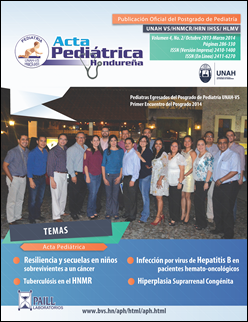Resilience and sequels in children surviving cancer
DOI:
https://doi.org/10.5377/pediatrica.v4i2.2223Keywords:
Adjustment disorders, neoplasms, psychological resilienceAbstract
Background: Cancer is pandemic in Latin America. 40,000 new cases are diagnosed each year in children and up to 67% have some sequel. Resilience is considered the ability to recover quickly from illness, change or suffered misfortune.
Objective: To identify sequels and resilience in patients who survived a childhood cancer whom are currently attending monitoring and follow-up in consult of Pediatric Hemato-oncology at Hospital Mario Catarino Rivas (HNMCR) of San Pedro Sula.
Patients and Methods: A descriptive study with a, mixed scope (qualitative and quantitative) was conducted with two groups of patients. The first included 80 patients in surveillance regardless of age to which the questionnaire "Sequelae" was applied. The second group included 61 patients in surveillance of whom were older than 13 years and to whom the questionnaire "Impact of Cancer Scale" were applied to determine their resilience.
Results: Patients in surveillance were men in 65% of cases, 39% were school-aged children. 42 patients had a Sequelae, the most common was the scar. In the impact of cancer group 7 characteristics out of 8 had a positive resilience, the exception was "having children"
Conclusions: More than half of the surviving patients had some type of sequel because of their condition. Most patients had positive results except for the appearance related to "Having children", which found to have negative resilience.
Acta Pediátrica Hondureña, Vol. 4, No. 2 / Octubre 2013 a Marzo 2014: 291-297
Downloads
2000

